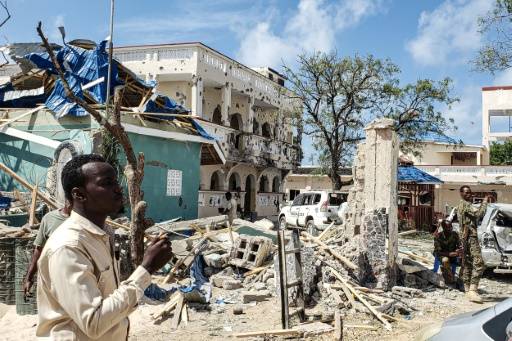9 dead, 47 wounded in attack on Somalia hotel

Nine people were killed and 47 wounded Sunday in an attack on a hotel in Kismayo, southern Somalia, claimed by the Al-Shabaab Islamist group, the region's security minister said.
The port city is the latest to be hit following a recent resurgence of attacks by the Al-Qaeda-linked group, which has mainly targeted the capital Mogadishu and central Somalia.Read More : Somali hotel rises again following al Shabaab bombing Sunday's assault began at 12:45 p.m. when a booby-trapped car rammed the entrance of Hotel Tawakal. It ended around 7:00 pm after the attackers were killed by security forces.
Among the casualties were students leaving a nearby school, Jubaland security minister Yusuf Hussein Osman told reporters. All four attackers, including the suicide bomber, were killed, he added.
"The first one detonated himself and the (remaining) three were killed by the security forces", he said, confirming an early police statement.
"This is not a government target," police officer Abdullahi Ismail said. "It is just an ordinary, civilian-frequented hotel."
Farhan Hassan was outside the hotel when the attack happened. "A suicide bomber drove a vehicle into the entrance of the hotel before the gunmen entered the building," he said.
Al-Shabaab claimed responsibility for the six-hour attack, saying members of the federal government of Jubaland, where Kismayo is located, were meeting in the hotel at the time.
Al-Shabaab has been trying to overthrow the government for more than 15 years and regularly attacks civilian and military targets.
Kismayo was once an Al-Shabaab stronghold before it was taken over in 2012 by local militias backed by Kenyan forces.
In August, the group launched a 30-hour gun and bomb attack on the popular Hayat hotel in Mogadishu, killing 21 people and wounding 117.
In 2019, the group conducted a similar attack on a hotel in Kismayo, killing 26 and injuring 56.
Somali President Hassan Sheikh Mohamud, who was elected in May, vowed after the August siege to wage "all-out war" on the Islamists.
In September he urged citizens to stay away from areas controlled by jihadists, saying the armed forces and tribal militia were ratcheting up offensives against them.
A joint US-Somali drone strike killed one of the militants' most senior commanders on October 1. Just hours after his death was announced, a triple bombing in the southern city of Beledweyne killed at least 30 people.
In addition to violence, Somalia -- like its neighbours in the Horn of Africa -- is in the grip of the worst drought in more than 40 years. Four failed rainy seasons have wiped out livestock and crops.
Some 7.8 million Somalis -- nearly half the population -- are affected by the drought and 213,000 are on the brink of famine as a result, according to the United Nations
The port city is the latest to be hit following a recent resurgence of attacks by the Al-Qaeda-linked group, which has mainly targeted the capital Mogadishu and central Somalia.
Among the casualties were students leaving a nearby school, Jubaland security minister Yusuf Hussein Osman told reporters. All four attackers, including the suicide bomber, were killed, he added.
"The first one detonated himself and the (remaining) three were killed by the security forces", he said, confirming an early police statement.
"This is not a government target," police officer Abdullahi Ismail said. "It is just an ordinary, civilian-frequented hotel."
Farhan Hassan was outside the hotel when the attack happened. "A suicide bomber drove a vehicle into the entrance of the hotel before the gunmen entered the building," he said.
Al-Shabaab claimed responsibility for the six-hour attack, saying members of the federal government of Jubaland, where Kismayo is located, were meeting in the hotel at the time.
Al-Shabaab has been trying to overthrow the government for more than 15 years and regularly attacks civilian and military targets.
Kismayo was once an Al-Shabaab stronghold before it was taken over in 2012 by local militias backed by Kenyan forces.
In August, the group launched a 30-hour gun and bomb attack on the popular Hayat hotel in Mogadishu, killing 21 people and wounding 117.
In 2019, the group conducted a similar attack on a hotel in Kismayo, killing 26 and injuring 56.
Somali President Hassan Sheikh Mohamud, who was elected in May, vowed after the August siege to wage "all-out war" on the Islamists.
In September he urged citizens to stay away from areas controlled by jihadists, saying the armed forces and tribal militia were ratcheting up offensives against them.
A joint US-Somali drone strike killed one of the militants' most senior commanders on October 1. Just hours after his death was announced, a triple bombing in the southern city of Beledweyne killed at least 30 people.
In addition to violence, Somalia -- like its neighbours in the Horn of Africa -- is in the grip of the worst drought in more than 40 years. Four failed rainy seasons have wiped out livestock and crops.
Some 7.8 million Somalis -- nearly half the population -- are affected by the drought and 213,000 are on the brink of famine as a result, according to the United Nations
Source: japantoday.com
